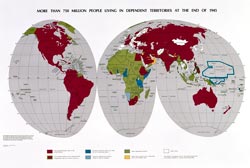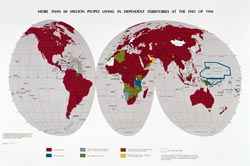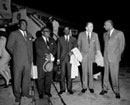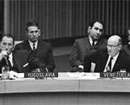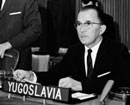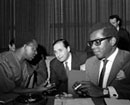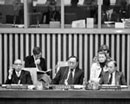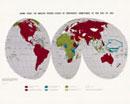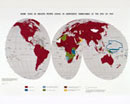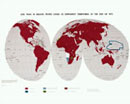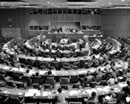|
Declaration on the Granting of Independence to Colonial Countries and Peoples
New York, 14 December 1960
By Edward McWhinney
Professor of International Law
The Declaration on the Granting of Independence to Colonial Countries and Peoples was adopted by the United Nations General Assembly on 14 December 1960. The deliberate location of the United Nations vote – in the General Assembly rather than in the Security Council where a permanent member’s veto would always be available to any one or more of the three permanent members that still had “colonial” legal ties or associations – was an obvious enough choice for the political activist States sponsoring resolution 1514 (XV). And the timing of the vote – in 1960, when the decolonisation process was already well under way – was hardly fortuitous. A working majority in favour of a patently anti-colonialist measure would not become politically possible until the General Assembly’s transformation from its original very narrow base of representation limited to the States members of the victorious wartime Alliance against Fascism to something more nearly reflective in cultural and ideological terms of the world community at large. By 1960, this had begun to be achieved, albeit on an intermittent, or casual, step-by-step basis, over the decade and a half from War’s end. The numerical breakthrough had occurred as late as 1955, when 16 new States had been admitted in one big step to membership, bringing the total to 76. In 1960 itself, 19 new States had been admitted, sealing the emergence of what became, in Cold War terms, a neutralist or uncommitted, majority voting coalition variously styled as the Non-Aligned bloc, the Group of 77, the Bandoeng group, the Developing or Third World countries. It was this informal electoral alliance, that provided the intellectual cohesiveness and also the political-tactical competence to secure the adoption of resolution 1514 (XV) without a single expressed dissent in the General Assembly. Why a Declaration, and not something with more obvious and immediate concrete political and legal consequences? The answer must be that it was partly tactical, to convert potential negative votes in the General Assembly into softer, legally ineffective abstentions. But it also has something to do with the patently French civiliste, legal-systemic influences on its styling and drafting. The paradigm-model for resolution 1514 (XV) must be the great French Déclaration des droits de l’homme et du citoyen (Declaration of the Rights of Man and the Citizen) of 1789. Resolution 1514 (XV), like that historical example, is short and succinct, and written in clear, non-technical, often poetic language. In the end, the persuasiveness, in both political and legal terms, of resolution 1514 (XV) as Declaration must rest upon its claims to be an authoritative, interpretive gloss upon the Charter of the United Nations as originally written, amplifying and extending the Charter’s original historical imperatives so as to encompass the new historical reality of the post-World War II international society of the drives for access to full sovereignty and independence of erstwhile subject-peoples, in an emerging new, culturally inclusive, representative, pluralist world community. In its substantive law stipulations, the Declaration postulates what may be described as ordering principles, intended to guide the progressive development of international law in accordance with the General Assembly’s own explicit mandate under Article 13, paragraph 1 (a), of the Charter of the United Nations:
And there is the warning, in the premonition of possible future post-decolonisation conflicts (as, at the time, in the former Belgian Congo), against any attempt aimed at the partial or total disruption of the national unity and the territorial integrity of a (post-decolonisation) country (art. 6); and as to the obligation of all States to observe the Charter of the United Nations and the Universal Declaration of Human Rights as to equality and non-interference in the internal affairs of all States, and respect for the sovereign rights of all peoples and their territorial integrity (art. 7). The Declaration’s subsequent history, as a call for legislative activism – affirmative action – within the General Assembly (and, if politically opportune, within the Security Council) and certainly also for parallel initiatives in other coordinate United Nations institutions and agencies (the International Court of Justice in particular), has helped in a process of elevating the Declaration’s claimed juridical status to the rank of imperative principles of international law (jus cogens), binding, as such, on the United Nations as authoritative interpretation of the Charter’s norms and entering into general international law in the result. The Declaration was at the core of Security Council and General Assembly legislative initiatives that provided a legal base for reference to the International Court of Justice for Advisory Opinion in Namibia in 1971. The Declaration is also reflected, in its full spirit, in the International Court’s Advisory Opinion ruling on Western Sahara in 1975. In the immediate political context of the drafting and the diplomatic lobbying leading on to its adoption, the Declaration was generally understood as being directed to “salt-water” Colonialism – occupation of the lands and territories of indigenous, native or aboriginal peoples, in Africa, Asia and the Caribbean, who were physically separated by the oceans from their colonial Powers. There is nothing in the language or the spirit of resolution 1514 (XV) inhibiting its legal extension to situations involving relations between European colonial Powers and other European or European-derived peoples overseas. In a major ruling, the International Court of Justice, being seised of a legal complaint of military and paramilitary support by the United States Government for forces from outside Nicaragua attempting to overthrow Nicaragua’s elected government, may have come close in its strong judicial majorities to making such a connection. Within the General Assembly itself, the Declaration gave birth immediately to further legislative acts whose ties of consanguinity to resolution 1514 (XV) are clear: resolution 1515 (XV) of 15 December 1960, on the sovereign right of States to dispose of their own wealth and natural resources and resolution 1803 (XVII) of 14 December 1962, on States’ permanent sovereignty over those natural resources. The further Declaration on the Establishment of a New International Economic Order and the related Programme of Action (resolutions 3201 (S-VI) and 3202 (S-VI) of 1 May 1974), and the Charter of Economic Rights and Duties of States (resolution 3281 (XXIX) of 12 December 1974) are demonstrations of the prophetic quality of resolution 1514 (XV) in providing an inevitable legal linkage between self-determination and its goal of decolonisation, and a postulated new international law-based right of freedom also in economic self-determination. Collateral questions arising from resolution 1514 (XV) concern its consequences for the continued validity in legal terms of the former territorial frontiers from the colonial era in the post-decolonisation context. The new Organisation of African Unity had displayed, in the early post-decolonisation period, a concern for avoiding the internecine conflicts over territorial frontiers and the resultant pursuit by military means of “natural frontiers”. The pragmatic conclusion was that it might be wisest for the new African States to accept, at least for the moment, the legitimacy of their own newly-inherited territorial demarcations even where, as very often happened, they had arbitrarily divided indigenous peoples or “nations” belonging to distinct ethno-cultural communities. Openings in judicial terms to the Latin American legal doctrine of uti possidetis, as in the legal discussion in Frontier Dispute (Burkina Faso/Mali), a ruling in 1986 by a Special Chamber of the International Court of Justice, perhaps do not take full account of that doctrine’s own special, intrinsically regional character as a concept limited to disputes inter se of the South American Succession States to the former Spanish and Portuguese colonial Powers. The Badinter Commission’s attempt in 1992 to extrapolate the Latin American uti possidetis doctrine to the international boundaries of the succession States to the Former Socialist Federal Republic of Yugoslavia may be questioned substantively on the same basis. The large conclusion must be that the Declaration has essentially fulfilled its original legislative objective of consolidating the political process, already entered upon, of legally terminating the old Colonial Empires, and of pressing on with all deliberate speed to successful conclusion of the process. With political and economic self-determination now assured for the new succession States, and their control over their own natural and other economic resources guaranteed, the way would be open to pursuing supervening, collateral issues now being canvassed – rectification of inherited frontiers, autonomous development of economic resources on a fully regional basis, and related regional security questions – under other, different legal categories and in other, predominantly diplomatic-legal arenas in aid to the General Assembly’s original great legislative act. This Introductory Note was written in August 2008.
Related Materials
The question of a declaration on the granting of independence to colonial countries and peoples was initially proposed for inclusion in the agenda of the General Assembly by Nikita S. Khrushchev, the Chairman of the Council of Ministers of the Union of Soviet Socialist Republics (USSR), during his address to the Assembly on 23 September 1960. This proposal was formalized in a letter to the President of the General Assembly of the same day (A/4501, 23 September 1960), which was submitted together with a draft Declaration on the granting of independence to colonial countries and peoples (A/4502, 23 September 1960). On 28 September 1960, the General Committee recommended that the item proposed by the USSR be included in the General Assembly’s agenda at its fifteenth session of the same year and that it be allocated to the First (Political and Security) Committee. On 10 October, the General Assembly decided to place the item on its agenda and, on 13 October, a proposal by the USSR to discuss the item in plenary meetings was unanimously adopted. The topic was discussed in the General Assembly from 28 November to 7 December 1960 and from 13 December to 14 December 1960 (A/PV.925-939 and A/PV.944-947). The General Assembly had before it, in addition to the draft Declaration submitted by the USSR (A/4502), another draft submitted, on 28 November, by Cambodia on behalf of 26 Asian and African countries, which was eventually sponsored by 43 delegations (A/L.323 and Adds. 1 to 6). The latter draft was adopted without change by the General Assembly, by a vote of 89 to 0, with 9 abstentions, in resolution 1514 (XV) entitled “Declaration on the Granting of Independence to Colonial Countries and Peoples”. The following year, upon the request of the USSR, the General Committee recommended to the General Assembly that an item entitled “The situation with regard to the implementation of the Declaration on the granting of independence to colonial countries and peoples” be included on the agenda of its sixteenth session, in 1961. The General Assembly decided to include this item in its agenda on 25 September 1961. On 27 November 1961, the General Assembly adopted resolution 1654 (XVI), by which it decided to establish a Special Committee of seventeen members with a mandate to make suggestions and recommendations on the progress and extent of the implementation of the Declaration, and to report to the General Assembly. On 23 January 1962, the President of the General Assembly appointed, in accordance with the resolution, the seventeen members of the Special Committee. The same year, in resolution 1810 (XVII) of 17 December 1962, the membership of the Special Committee was enlarged by seven members, resulting in a total of twenty-four members. The Special Committee was further invited to propose specific measures of implementation for the complete application of the Declaration, and to report to the General Assembly no later than at its eighteenth session. At that session, in 1963, the General Assembly considered the report by the Special Committee (A/5446/Rev.1) and requested the Special Committee to continue to seek the best ways and means for the immediate and total application of the Declaration, and report to the General Assembly no later than at its nineteenth session, in 1964. The Committee was further invited to apprise the Security Council of any developments in any territories which may threaten international peace and security (resolution 1956 (XVIII) of 12 December 1963). In addition, the functions of the Special Committee were expanded to include the work of the Committee on Information from Non-Self-Governing Territories, which was dissolved, in resolution 1970 (XVIII) of 16 December 1963. The Special Committee continues to exist and meets annually to consider problems connected with colonial territories, as well as topics of a more general nature assigned to it by the General Assembly. Text of the Declaration Selected preparatory documents Letter of 23 September 1960 from the Chairman of the Council of Ministers of the Union of Soviet Socialist Republics addressed to the President of the General Assembly, “Request for the inclusion of an additional item in the agenda of the fifteenth session: item proposed by the Union of Soviet Socialist Republics” (A/4501, , 23 September 1960)
|
||||||||||||||||||||||||||||||||||||||||||||||||||||||||||||||||||||||||||||||||||||||||||||||||||||||||||||||||||||||||||||||||||||||||||||||||||||||||||||||||||||||||||||||||||||||||||||||||||||||||||||||

